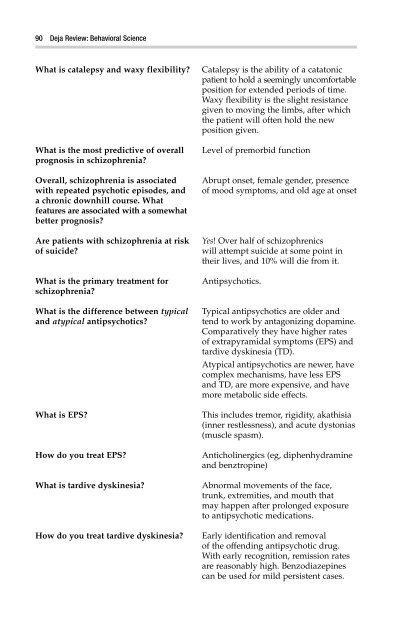Behavioral Science
You also want an ePaper? Increase the reach of your titles
YUMPU automatically turns print PDFs into web optimized ePapers that Google loves.
88 Deja Review: <strong>Behavioral</strong> <strong>Science</strong><br />
Give at least two examples of abnormal<br />
thought formation.<br />
• Word salad: Words and phrases are<br />
combined together in incoherent<br />
manner.<br />
• Neologisms: Creation of new words.<br />
• Echolalia: Repeating the same word<br />
over and over (almost like a mental<br />
stutter).<br />
• Loose associations: Illogical shifting<br />
between unrelated or obliquely<br />
related topics.<br />
• Thought blocking.<br />
• Circumstantial and tangential<br />
thought: Circumstantial thought<br />
eventually gets to the point;<br />
tangential never does.<br />
X<br />
X Y<br />
W<br />
A B A B A B<br />
Normal Circumstantial Tangential<br />
Y<br />
Z<br />
What is meant by the prodromal and<br />
residual phases of schizophrenia?<br />
How long must you have symptoms for<br />
before schizophrenia can be diagnosed?<br />
How does schizophreniform disorder<br />
differ from schizophrenia?<br />
These are periods of time before and<br />
after active psychotic periods,<br />
respectively. These periods are<br />
generally characterized by attenuated<br />
symptoms of the active phase, eg, social<br />
withdrawal, peculiar behavior, or odd<br />
affect.<br />
During these periods a person would<br />
seem strange but would not necessarily<br />
meet criteria for psychotic.<br />
At least 6 months including prodromal<br />
and residual phases, but they must have<br />
at least 1 month of active characteristic<br />
symptoms (above), as well as decline in<br />
function.<br />
The duration is



